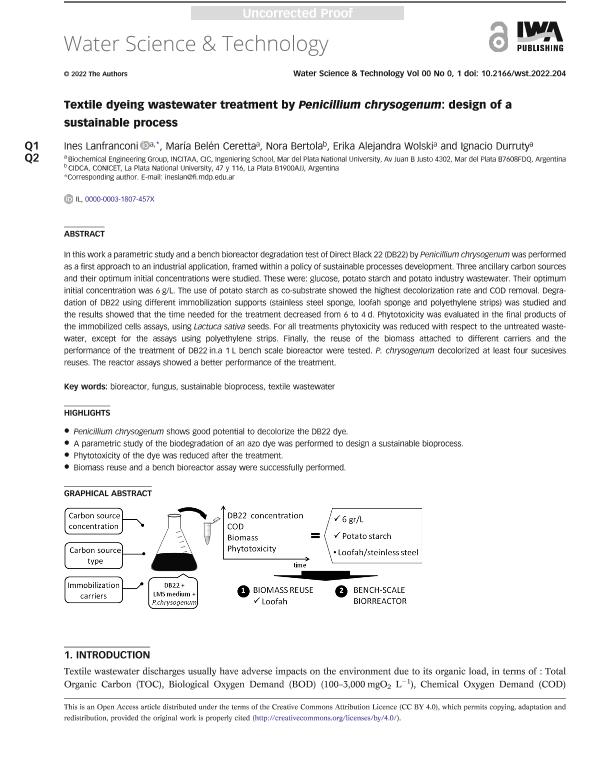Artículo
Textile dyeing wastewater treatment by Penicillium chrysogenum: design of a sustainable process
Lanfranconi, Ines ; Ceretta, Maria Belen
; Ceretta, Maria Belen ; Bertola, Nora Cristina
; Bertola, Nora Cristina ; Wolski, Erika Alejandra
; Wolski, Erika Alejandra ; Durruty, Ignacio
; Durruty, Ignacio
 ; Ceretta, Maria Belen
; Ceretta, Maria Belen ; Bertola, Nora Cristina
; Bertola, Nora Cristina ; Wolski, Erika Alejandra
; Wolski, Erika Alejandra ; Durruty, Ignacio
; Durruty, Ignacio
Fecha de publicación:
07/2022
Editorial:
IWA Publishing
Revista:
Water Science And Technology
ISSN:
0273-1223
Idioma:
Inglés
Tipo de recurso:
Artículo publicado
Clasificación temática:
Resumen
In this work a parametric study and a bench bioreactor degradation test of Direct Black 22 (DB22) by Penicillium chrysogenum was performed as a first approach to an industrial application, framed within a policy of sustainable processes development. Three ancillary carbon sources and their optimum initial concentrations were studied. These were: glucose, potato starch and potato industry wastewater. Their optimum initial concentration was 6 g/L. The use of potato starch as co-substrate showed the highest decolorization rate and COD removal. Degradation of DB22 using different immobilization supports (stainless steel sponge, loofah sponge and polyethylene strips) was studied and the results showed that the time needed for the treatment decreased from 6 to 4 d. Phytotoxicity was evaluated in the final products of the immobilized cells assays, using Lactuca sativa seeds. For all treatments phytoxicity was reduced with respect to the untreated wastewater, except for the assays using polyethylene strips. Finally, the reuse of the biomass attached to different carriers and the performance of the treatment of DB22 in a 1 L bench scale bioreactor were tested. P. chrysogenum decolorized at least four sucesives reuses. The reactor assays showed a better performance of the treatment.
Palabras clave:
BIOREACTOR
,
FUNGUS
,
SUSTAINABLE BIOPROCESS
,
TEXTILE WASTEWATER
Archivos asociados
Licencia
Identificadores
Colecciones
Articulos(CCT - MAR DEL PLATA)
Articulos de CTRO.CIENTIFICO TECNOL.CONICET - MAR DEL PLATA
Articulos de CTRO.CIENTIFICO TECNOL.CONICET - MAR DEL PLATA
Articulos(CIDCA)
Articulos de CENTRO DE INV EN CRIOTECNOLOGIA DE ALIMENTOS (I)
Articulos de CENTRO DE INV EN CRIOTECNOLOGIA DE ALIMENTOS (I)
Citación
Lanfranconi, Ines; Ceretta, Maria Belen; Bertola, Nora Cristina; Wolski, Erika Alejandra; Durruty, Ignacio; Textile dyeing wastewater treatment by Penicillium chrysogenum: design of a sustainable process; IWA Publishing; Water Science And Technology; 86; 2; 7-2022; 292-301
Compartir
Altmétricas



